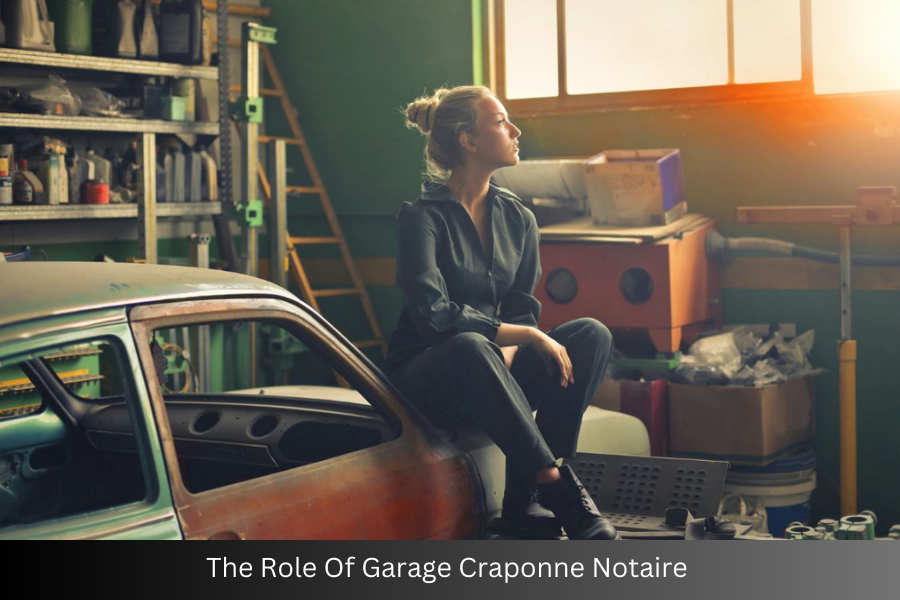Introduction
In France, the role of the notaire is crucial for the legal and smooth execution of property transactions. A notaire is a public officer who ensures that legal procedures are correctly followed during property sales, including real estate like Garage Craponne Notaire, a commune in the Rhône department. Notaires hold an important position within the French legal system, acting as intermediaries between the parties involved in property transactions, such as the buyer and seller.
The responsibilities of a notaire are vast, extending beyond simply witnessing signatures on contracts. They ensure that all the necessary legal documentation is accurate, that the transaction complies with local laws, and that both parties understand their rights and obligations. Notaires are responsible for making the transaction legally binding, verifying that there are no debts or claims on the property, and managing the transfer of funds, taxes, and legal fees.
WIki Table
| Aspect | Details |
| Location | Craponne, Rhône Department, France |
| Role of Notaire | A notaire in France is a public officer who oversees legal property transactions, ensuring legal compliance. |
| Primary Responsibilities | – Verifying property titles- Drafting sale agreements- Ensuring tax and legal compliance- Financial oversight |
| Typical Property | Garages, often used for commercial or storage purposes, some with historical significance. |
| Transaction Process | Involves document verification, contract preparation, tax calculation, and legal guidance. |
| Notaire Fees | Includes transfer taxes (frais de notaire), notaire’s service fees, and any other relevant legal fees. |
| Legal Considerations | Zoning laws, environmental regulations, property history, and compliance with local building codes. |
| Typical Timeline | Around 6-12 weeks, depending on the complexity of the sale and necessary verifications. |
| Benefits of a Notaire | – Legal protection- Transparent transactions- Ensures financial compliance- Minimizes disputes |
| Challenges | Zoning restrictions, historical property concerns, environmental regulations, and commercial use issues. |
Notaires and the Purchase of Garage Craponne Notaire
Craponne is a dynamic area, with various types of properties, including garages, attracting attention from both commercial and residential buyers. Notaires are integral to ensuring that these transactions proceed smoothly, offering both legal and financial guidance throughout the process.
Garage Craponne Notaire, particularly those used for commercial purposes or as storage spaces, have become increasingly popular. Historically, these properties served a variety of functions, from workshops to automotive repair spaces, and today they serve as investment properties for small businesses and entrepreneurs. With the area’s close proximity to Lyon, the demand for commercial spaces like garages has only increased.
Notaires ensure that all legal aspects of buying and selling garages in Craponne are handled professionally. They help clarify the ownership of the property, making sure that all legal documentation is in order and that no outstanding debts or encumbrances exist on the property. A notaire’s involvement is especially important for investors or individuals unfamiliar with the local legal requirements.
Responsibilities of a Notaire in Garage Sales
- Document Verification One of the key tasks of a notaire is to verify the authenticity of all documents related to the property. This includes the title deed, proof of ownership, and any previous contracts related to the property. A notaire ensures that the seller has the legal right to sell the garage and that the property is free from any encumbrances, such as unpaid mortgages or legal disputes.
They also verify that the property complies with local building codes and zoning laws. This is particularly important for garages, which may be used for commercial purposes. Notaires will check if the property is zoned appropriately for its intended use. - Preparation of Sale Agreement A notaire drafts the official sale agreement, which outlines the terms of the transaction. The contract will include details about the sale price, the conditions of the property, and the responsibilities of both parties involved. The notaire ensures that the contract complies with French property law and is signed in their presence, adding an official and legal seal to the agreement.
The notaire will also explain the terms of the sale to both the buyer and seller to ensure full understanding. This is important because property transactions in France can involve complex legal language, which may be difficult for non-legal professionals to understand without assistance. - Financial Oversight The notaire is also responsible for managing the financial aspects of the transaction. This includes ensuring that the buyer’s payment is secure, handling the transfer of funds, and ensuring that taxes and fees are properly paid. The notaire will calculate the transfer tax, which is a percentage of the sale price, and ensure that both parties understand their financial obligations.
This is particularly important in the case of commercial properties, like garages, where additional taxes may apply. A notaire also ensures that the seller receives the payment securely and that the financial transaction is carried out in accordance with the law. - Tax and Legal Compliance Notaires are responsible for ensuring that both parties comply with French tax laws. This includes ensuring that the transfer taxes, which can vary depending on the value of the property, are paid correctly. Additionally, the notaire will ensure that any outstanding fees or charges related to the property are settled.
They also provide guidance on the tax implications of the sale for both the buyer and the seller, ensuring that the transaction does not result in unforeseen financial consequences. This is crucial in the case of commercial property, as tax laws can be complex and vary depending on the use of the property. - Official Registration Once all the paperwork has been signed, the notaire is responsible for registering the transaction with the relevant authorities. This ensures that the property’s ownership is officially transferred from the seller to the buyer. The notaire files the necessary paperwork with the land registry, ensuring that the transaction is recorded in the official property records.
This step is vital because, without registration, the sale would not be legally recognized, and the buyer would not have clear ownership of the garage. The notaire ensures that this final step is handled properly, securing the buyer’s legal claim to the property.
Why Notaires Are Important in Craponne’s Real Estate Market
- Historical and Legal Expertise Craponne is a historic commune with roots dating back to Roman times. Property transactions in such areas often have additional layers of complexity, such as the need to preserve historical buildings or ensure compliance with heritage preservation laws. Notaires in Craponne are well-versed in the local history and the specific legal requirements that apply to properties in the area.
For example, many garages in Craponne were originally built for agricultural or industrial use and may require additional permits or inspections before they can be used for modern commercial purposes. Notaires play an important role in helping navigate these legal challenges, ensuring that buyers are fully informed about the property’s history and its current legal status. - Ensuring Transparency and Trust In a real estate market that can sometimes be complex and opaque, notaires provide transparency and trust. Their involvement guarantees that all transactions are conducted ethically and legally. Buyers and sellers can rely on the notaire to protect their interests, whether it’s ensuring a smooth transfer of ownership or advising on tax issues.
- Economic Influence The market for garages in Craponne is reflective of broader economic trends. During periods of economic growth, the demand for commercial spaces increases, and the value of properties like garages can rise. Notaires help ensure that these economic fluctuations are accounted for, guiding both buyers and sellers through market ups and downs. They provide valuable insights into property trends, which helps inform decision-making.
- Protecting Buyers and Sellers A notaire’s primary role is to protect the interests of both parties in a property transaction. They provide legal advice, safeguard against potential disputes, and ensure that all terms of the transaction are met. Whether a buyer is purchasing a Garage Craponne Notaire for personal use or as an investment, having a notaire ensures that the process is legally sound.
The Challenges of Selling or Buying Garages in Craponne
- Property Zoning and Usage One of the most common challenges in buying or selling garages in Craponne is ensuring that the property is zoned appropriately for its intended use. Garages that were once used for industrial purposes may not automatically be approved for commercial or residential use. Notaires are essential in helping buyers understand any zoning restrictions or required permits.
- Legal Complexities French property laws can be complex, and the paperwork involved in a real estate transaction can be daunting for individuals unfamiliar with the system. Notaires simplify the process by explaining the legal requirements in plain language and guiding both parties through the steps needed to ensure the sale is legally binding.
- Environmental and Safety Regulations Many garages, particularly older properties, may need to be inspected to ensure they meet current environmental and safety regulations. Notaires can assist buyers in understanding the regulations and advise on whether additional inspections or upgrades will be necessary.
The Future of Garage Sales in Craponne
The market for Garage Craponne Notaire is evolving. With Lyon’s proximity and increasing demand for both commercial and residential spaces, the area is likely to see more interest from investors and entrepreneurs. As such, the role of notaires will only become more critical. Their legal expertise and guidance will continue to shape the real estate landscape, ensuring that transactions are not only profitable but also legally sound and sustainable for future generations.
Conclusion
In conclusion, the role of a notaire in transactions involving Garage Craponne Notaire is essential for ensuring that property sales proceed smoothly, legally, and with full transparency. From verifying the property’s legal status to managing the financial aspects and offering impartial legal guidance, notaires are vital figures in the French real estate market. Their expertise is especially critical in places like Craponne, where historical properties, such as garages, may involve additional layers of complexity, including zoning laws, building regulations, and environmental considerations. Whether you are a buyer, seller, or investor, working with a notaire ensures that you navigate the legal landscape of property transactions with confidence, protecting your interests and helping you achieve a smooth and legally compliant sale.
Frequently Asked Questions (FAQs)
1. What is a notaire, and why do I need one for purchasing a Garage Craponne Notaire?
A notaire is a French public officer who specializes in legal matters related to property transactions. They are responsible for drafting and executing contracts, verifying the legitimacy of property titles, and ensuring all legal requirements are met. If you’re purchasing a garage in Craponne, working with a notaire ensures that the sale is legally binding, the property is free of any encumbrances, and all taxes and legal fees are properly handled.
2. How does a notaire verify the ownership of a garage in Craponne?
Notaires verify ownership by checking the property’s title deed and historical records. They ensure that the seller has the right to sell the garage and that there are no outstanding legal disputes or claims against it. The notaire will also check for compliance with local zoning and building regulations to ensure the garage can be used for the intended purpose.
3. What steps does a notaire take to protect both the buyer and the seller in a garage transaction?
The notaire acts as a neutral party, ensuring that both the buyer and seller are protected. They prepare the sale contract, explain its terms to both parties, verify the property’s legal status, and handle the financial transactions, including taxes and fees. By overseeing these processes, the notaire ensures the transaction is fair, transparent, and legally binding.
4. What are the taxes and fees involved when purchasing a garage in Craponne?
When purchasing property in France, including garages, the buyer is responsible for paying a transfer tax (commonly referred to as frais de notaire), which is a percentage of the sale price. The notaire calculates and ensures these taxes are paid. Additional fees may include notaire’s fees, registration costs, and any necessary inspections or certifications, depending on the property’s condition.
5. Can a notaire help with the zoning and environmental regulations for a garage in Craponne?
Yes, a notaire can assist with understanding local zoning laws and environmental regulations. They will ensure that the garage complies with these laws and help the buyer navigate any required permits or inspections. This is particularly important if the garage is intended for commercial use or if it has historical significance.
6. What happens if there is an issue with the property after the sale is completed?
If issues arise after the sale, the notaire’s role is to ensure that both parties understand their legal rights and obligations. While they cannot mediate disputes post-sale, they can help clarify the terms of the contract and provide guidance on resolving legal matters. It is essential to address any concerns during the notaire’s involvement to avoid future complications.
7. How long does it take to finalize a garage sale with a notaire in Craponne?
The timeline for finalizing a garage sale with a notaire can vary, but it typically takes between 6 to 12 weeks. This period includes time for document verification, preparing the sale contract, ensuring compliance with regulations, and processing taxes and fees. The notaire will keep both parties informed throughout the process.
8. Can a notaire assist with selling a garage in Craponne as well as buying one?
Yes, a notaire can assist with both the buying and selling of a garage. For sellers, the notaire ensures that all necessary legal documents are in order, facilitates the transfer of ownership, and manages the financial aspects of the transaction. For buyers, the notaire ensures that the sale is legally binding and that all taxes and fees are correctly handled.
Discover the latest news and updates on Play Hop




